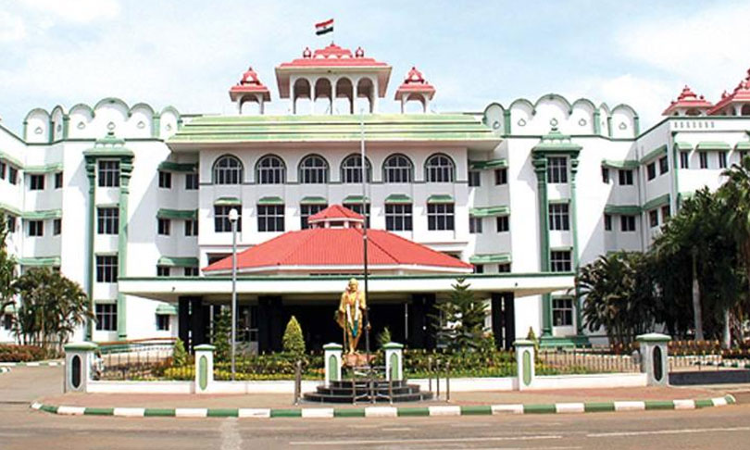- Home
- /
- High Courts
- /
- Madras High Court
- /
- Public Information Under RTI Act...
Public Information Under RTI Act Cannot Be Classified As Company's Official Document: Madras High Court
Upasana Sajeev
15 Oct 2025 7:18 PM IST
The Madras High Court recently upheld an order of a single judge setting aside the departmental proceeding against a man for pasting the information related to the party on the notice board. The bench of Justice CV Karthikeyan and Justice R Vijayakumar noted that the information, that was disclosed under the Right to Information Act would not be an “official document” of the...
The Madras High Court recently upheld an order of a single judge setting aside the departmental proceeding against a man for pasting the information related to the party on the notice board.
The bench of Justice CV Karthikeyan and Justice R Vijayakumar noted that the information, that was disclosed under the Right to Information Act would not be an “official document” of the company, or that relating to the company's internal operations. The court added that the information was already available in the public and was lawfully disclosed and pasting such information in the company's notice board would not be violative of the standing orders.
“It is relevant to note that the information disclosed was not an official communication in the traditional sense, but rather public information shared with an applicant, in this case, the spouse of the writ petitioner, pursuant to the provisions of the RTI Act, aimed at promoting transparency in the functioning of the respondent company. Such information cannot be classified as an “official document” or as relating to the internal operations or business of the company within the meaning of Sub-clause (16) of Rule 60 of the Standing Orders,” the court said.
The court was hearing a petition by the Manager of Bharat Heavy Electricals Limited [BHEL], Trichy, against the order of a single judge setting aside the departmental proceeding against the respondent, Aron.
The company's case was that Aron, who had been employed as a Crane Operator, had obtained information relating to the company's recruitment through the RTI Act in the name of his wife. Thereafter, he had displayed this information on the notice board of the canteen and had thus allegedly committed misconduct. The company had issued a show-cause notice to Aron. Though he submitted his reply, the company had initiated disciplinary action against him, finding the response to be unsatisfactory.
The company relied on Clause 60(16) of the Standing Orders of the company, dealing with unauthorised communication of official documents or information, and disclosure to unauthorised persons of information relating to the company's operations and business.
The employee, on the other hand, submitted that there was no evidence to show that he had pasted the information on the Notice Board. it was submitted that even if it was assumed that he had pasted the information, it would not amount to unauthorised communication. It was submitted that the information was obtained through the RTI Act and was not disseminated to the general public but only displayed in the Notice Board, which was accessible only by the staff and officers of the appellant company.
The court noted that the information obtained was with respect to the selection process, the number of candidates selected, state of origin, their communities, categories, etc. The court observed that the information was merely statistical data which, if served, would only enhance the reputation of the company by showing that the company adhered to the rules and guidelines of the selection process.
The court further noted that even the company had not treated the information as exempt from public disclosure and had disseminated the information by way of RTI to a third person. the court further remarked that the publication of the information also did not cause any disturbance. Thus, the court said that the only grievance that the company could have raised was that the information was pasted without prior permission.
The court, however, noted that even so, the charges as alleged would not be attracted, as it was not unauthorised communication of an official document.
“In the present case, the information pasted on the Notice Board was not confidential, sensitive, or exempt from disclosure. On the contrary, it was information disseminated by the respondent themselves, in accordance with the RTI Act. The respondent, by voluntarily furnishing the said details, had implicitly acknowledged that the information was not exempt from public disclosure and therefore that it could be disseminated to the general public. Therefore, it cannot be reasonably contended that the writ petitioner committed misconduct by displaying information that the respondent themselves had deemed suitable for public access,” the court said.
Thus, the court held that the single judge had rightly appreciated the evidence and held that the issuance of the charge memo and departmental proceedings was baseless. Thus, the court dismissed the appeal.
Counsel for Appellant: Mr. A. V. Arun
Counsel for Respondents: Mr. T. Antony Arul Raj
Case Title: The Manager v. Aron K Thiraviaraj
Citation: 2025 LiveLaw (Mad) 357
Case No: W.A.(MD)No.471 of 2020



